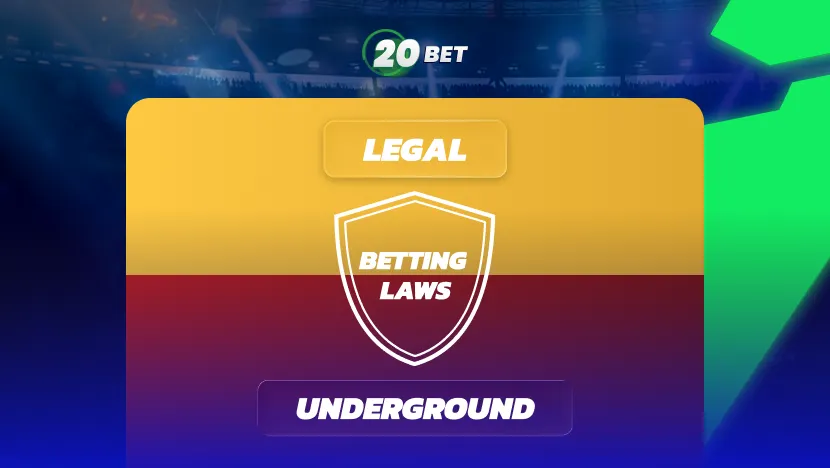Legal sports betting looks very different depending on where you live. Some places have mature oversight. Others are opening up. A few still prohibit everything. Below, I walk through how the legal side works, what “underground betting” actually is, and why the gap matters for fans, governments, and sport integrity.
Legal Betting Markets: Frameworks & Examples
Before comparing countries where gambling is illegal with places that allow legal online sports betting, it helps to map the basic playbook. Legalized sports betting usually means clear legislation, a licensing framework, day-to-day compliance, and active enforcement. You also see rules for ads, identity checks, data security, and payouts. The best-run markets share common features.
Licensing and Regulation Basics
Every legal market rests on three pillars. First, a license that allows a sportsbook to operate. Second, regulation that sets rules on identity verification (KYC), anti-money laundering (AML), advertising, and game integrity. Third, enforcement that audits operators, issues a fine or sanction when rules are broken, and blocks illegal sites.
You also get public registers of licensees, dispute channels, self-exclusion, deposit limits, and regular reporting to an authority. Strong oversight improves transparency and accountability, which is the goal of good governance.
Quick Snapshot: Selected Legal Markets
| Country/Region | Regulator | Is online sports betting legal? | Headline focus 2024–2025 |
| UK | UK Gambling Commission | Yes | Marketing guardrails; product design safety; affordability checks |
| France | ANJ | Yes | Domain blocking, integrity monitoring, and ad oversight |
| Italy | ADM | Yes | Licensing refresh; stricter compliance; domain declarations |
| Canada (Ontario) | AGCO / iGaming Ontario | Yes | Competitive market since Apr 2022; updated RG standards |
| USA | State regulators | Yes, state-by-state | 30+ legal online sport betting live; tax and ad policies vary |
| Brazil | Ministry of Finance | Yes, licensing is underway | Law 14,790/2023 implementing fixed-odds regulation |
| Colombia | Coljuegos | Yes | First-wave LatAm model; stable compliance baseline |
Mature Legal Markets
The UK, France, and Italy are classic examples of “mature” markets, where regulation has been in place for years and keeps evolving. These regulators publish license lists, run regular audit programs, and openly post enforcement actions, so players and operators can see what actually happens in the market.
When new data on problem gambling, match-fixing, or misleading advertising appears, they adjust the rules rather than leaving them on autopilot. That is why you now see tighter marketing rules in the UK, proactive domain blocking in France, and a refreshed licensing and renewal cycle in Italy. For operators, this creates predictable policy and a clear framework to work within, instead of constant surprises.
Emerging Legal Markets
Brazil is formalizing fixed-odds betting through Law 14,790/2023, with clear rules on licensing, local presence, and taxation, as in the table above. Colombia has been regulated since 2016 and remains a Latin American reference point. These markets focus on monitoring, investigation, and reporting so spend moves from grey channels into taxed, supervised ones.
Underground Betting: Features & Risks
If legal online sports betting markets are about paperwork and oversight, underground sports betting is the opposite. Think offshore sites or local cash bookies that dodge jurisdiction and skip consumer protections. The experience can look slick. The safety net is missing.
What Constitutes Underground/Unregulated Betting
Any operator taking bets without a required local license or in a jurisdiction with a full prohibition. This includes offshore sportsbooks marketing into restricted countries and encrypted chat groups settling cash wagers with no audit trail.
Common Features: Offshore Sites, Grey-Market Operators
Red flags are easy to spot. No local license badge. Mirror domains. Payment workarounds. Unrealistic bonuses. Vague terms. No recognized dispute body or self-exclusion. These outfits avoid oversight and reporting, so they naturally attract people who want to move money quietly or manipulate results.
In parts of Europe and Latin America, regulators already order internet providers and payment firms to block them, while some Middle Eastern and Asian countries treat similar operations as illegal gambling that can bring criminal penalties.
Risks to Bettors and to the Integrity of Sport
The personal risks add up quickly. Balances can be frozen. Wins can be voided. Identity and payment data can be exposed, and there is often no practical way to get help. The wider risks are even larger. Underground networks enable match-fixing pipelines, facilitate money laundering, and drain public taxation revenue. Without clear monitoring and investigation duties, these books create blind spots that regulators cannot easily see or control.
Regional Variations in Betting Laws
The answer to “Where is sports betting legal?” depends on local values, politics, and economics. Some regions ban everything. Others allow partial models such as fixed-odds only. Many sit in the middle with hybrid rules that shift as regulators update taxes, advertising limits, or licensing requirements.
Strict Prohibition Zones
Parts of the Middle East still ban gambling under penal codes and religious law. The UAE created a federal regulator (GCGRA) and has signaled openings, but gambling remains a tightly controlled exception regime; operating without approval remains a criminal offense. Saudi Arabia continues a full ban.
Hybrid or Partial Regulation
A few examples show how mixed models work. South Africa permits online fixed-odds betting but does not allow online interactive casino games. Kenya regulates betting through local licenses, yet constant changes to tax rates and advertising rules have pushed some operators out of the market and redirected part of the audience toward offshore options. Players who ask about “sports betting legal in other countries” often run into these hybrids, which keep the legal pathway open while grey markets persist.
How Culture, Religion and Economics Influence Regulation
Religion drives prohibition in parts of the Middle East and Asia. Public health and advertising harm motivate stronger guardrails in Europe. Tax needs and channelization goals push North and Latin America toward broader frameworks. In practice, governance mirrors local norms and budget priorities, which is why Asian markets where sports betting is legal often look different from Europe or North America.
Consequences of Underground Betting for Legal Markets
Underground betting does not stop at the player level. It affects how legal markets function. The same three pressure points appear everywhere. Money, protection, and sports integrity.
Revenue Loss and Tax Evasion
A legal market channels betting taxes into public budgets, so money can go to things like schools, healthcare, and sport. In countries with mature markets, that easily adds up to billions of dollars a year in tax receipts. Illegal and underground operators pay none of it. When legal taxes or product restrictions feel too heavy, some bettors drift toward those untaxed options instead, and that slowly shrinks the regulated tax base.
Consumer Protection and Responsible Gambling Challenges
Licensed markets mandate KYC/AML, self-exclusion, safer-gambling tools, and dispute processes. Underground operators typically don’t. The UK’s 2025 rule changes on marketing and product design illustrate how regulators iterate to reduce harm, something the grey market doesn’t do.
Sport Integrity, Money Laundering and Regulatory Burden
International crime and integrity reports have shown for years that illegal betting is closely linked to organized crime and match manipulation. Legal operators feed suspicious activity reports to regulators and integrity bodies. Underground outfits don’t, increasing the regulatory burden on states to investigate and clean up.
Responsible Gambling
If you’re in a legal market, use the built-in tools: deposit limits, time-outs, self-exclusion, and reality checks. For help: in the U.S., the National Problem Gambling Helpline is 1-800-522-4700 (24/7 call/text/chat). In Canada (Ontario), ConnexOntario offers free, confidential support and referrals. In Great Britain, GamCare runs the National Gambling Helpline. These services are confidential and can guide you to local support.
FAQ
What’s the main difference between legal and underground betting markets?








